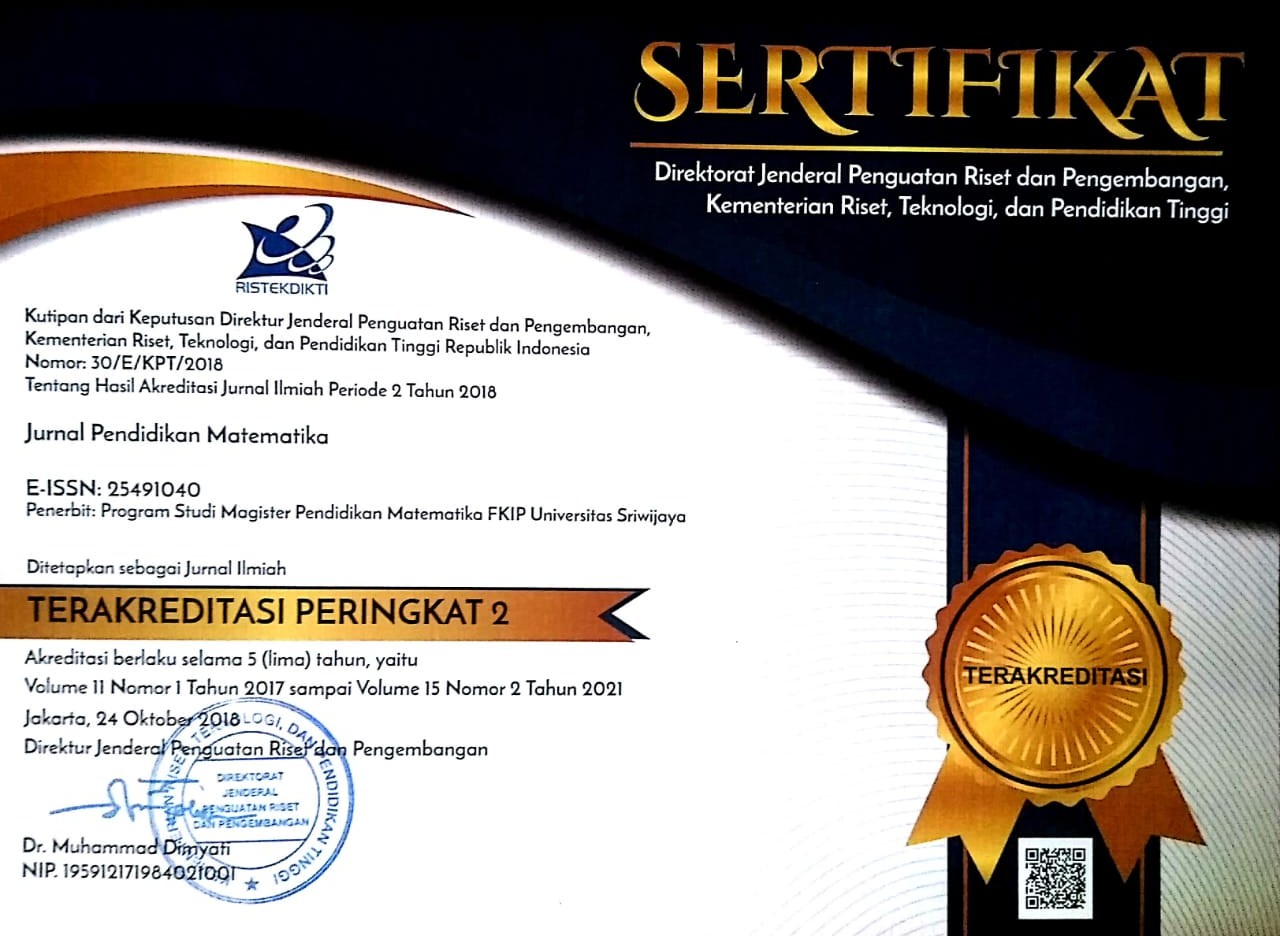APLIKASI METODE SCAMPER DALAM PENGEMBANGAN DESAIN PEMBELAJARAN MATEMATIKA DI SEKOLAH DASAR
Abstract
Penelitian ini bertujuan untuk menguji pengaruh penggunaan metode SCAMPER terhadap kemampuan mahasiswa dalam mengembangkan desain pembelajaran matematika di kelas rendah sekolah dasar. Untuk menjawab pertanyaan penelitian, penelitian ini menerapkan metode pra-eksperimental berdesain pra tes-pasca tes satu kelompok. Data kemampuan mahasiswa dalam mengembangkan pembelajaran diperoleh dengan menggunakan IPPSD yang terdiri atas 20 item. Analisis data ditujukan pada uji signifikansi pengaruh metode SCAMPER dengan membandingkan skor prates dan pascates. Hasil analisis data menunjukkan terdapat perbedaan antara skor rerata prates dan pascates. Dari analisis data diperoleh kesimpulan metode SCAMPER berpengaruh positif terhadap kemampuan mahasiswa dalam mengembangkan desain pembelajaran matematika di kelas rendah.
Keywords
Full Text:
PDFReferences
Alrwaished, N., Alkandari, A., &Alhashem, F. (2017). exploring in-and preservice science and mathematics teachers’ technology, pedagogy, and content knowledge (TPCAK): what next?. Eurasia Journal of Mathematics Science and Technology Education, 13 (9), 6113-6131.
C?elikler, D. & Harman, G. (2015). The effect of the scamper technique in raising awareness regarding the collection and utilization of solid waste. Journal of Education and Practice, 6 (10), 149-159.
Dick, W., Carey, L., & Carey, J.O. (2009). The systematic design of instruction. Upper Saddle River, NJ: Pearson.
Eberle, R.F. (1972). Developing imagination through scamper. Journal of Creative Behavior, 6 (3), 199-203.
Gall, J. P., Gall, M. D., & Borg, W. R. (2010). Applying educational research. Boston: Pearson.
Fahmy, G. A., Qoura, A. A., & Hassan, S. R. (2017). Using SCAMPER-based Activities in Teaching Story to Enhance EFL Primary Stage pupils'Speaking Skills (An Exploratory Study), Journal of Research in Curriculum, Instruction and Educational Technology, 3 (4), 11-33.
Hasan, H. (2015). Kendala yang dihadapi guru dalam proses belajar mengajar matematika di SD Negeri Gani Kabupaten Aceh Besar. Jurnal Pesona Dasar, 1 (4), 40-51.
Hussain, M. & Carignan, A. (2016). Fourth graders make inventions using SCAMPER and animal adaptation ideas. Journal of STEM Arts, Crafts, and Constructions, 1 (2), 48-66.
Idek, S. (2016). Measuring the application of SCAMPER technique in facilitating creative and critical thinking in composing short stories and poems. Malaysian Journal of Higher Order Thinking Skills in Education, 2, 30-53.
Jansen, C., & Van der Merwe, P. (2015). Teaching practice in the 21st century: emerging trends, challenges and opportunities. Universal Journal of Educational Research, 3 (3), 190-199.
Jarminata, N. (2015). Kesulitan pemahaman konsep matematis siswa dalam pembelajaran matematika di kelas awal Sekolah Dasar. Pionir: Jurnal Pendidikan, 4 (2),1-6.
Ang, K. Y., & Yuen, M. C. (2016). A Student’s Perspective of Scamper Technique Used For Multimedia Asset Creation. Conference Proceeding: 2nd International Conference on Creative Media, Design, and Technology (REKA 2016). Penang: Malaysia.
OECD. (2015). Programme for International Student Assessment (PISA) Results from PISA 2015. https://www.oecd.org/pisa/PISA-2015-Indonesia.pdf.
Ozyaprak, M. (2016). The effectiveness of SCAMPER technique on creative thinking skills. Journal for the Education of Gifted Young Scientists, 4 (1), 31-40.
Phonapichat, P., Wongwanich, S., & Sujiva, S. (2014). An analysis of elementary school students’ difficulties in mathematical problem solving. Procedia-Sosial and Behavioral Science, 116, 3169-3174.
Reiser, R. A. & Dick, W. (1996). Instructional planning: a guide for teachers. (1996). Boston: Allyn and Bacon.
Saja’ah, U. F. (2018). Analisis kesulitan siswa kelas IV Sekolah Dasar dalam menyelesaikan soal pemecahan masalah. Eduhumaniora: Jurnal Pendidikan Dasar, 10 (2), 98-104.
Selvianiresa, D. (2017). Kesulitan siswa sekolah dasar pada materi nilai tempat mata pelajaran matematika di kelas 1 SD. Pendas: Jurnal Ilmiah Pendidikan Dasar, 2 (1), 65-73.
Waskitoningtyas, R. S. (2016). Analisis kesulitan belajar matematika siswa kelas V Sekolah Dasar Kota Balikpapan pada materi satuan waktu tahun ajaran 2015/2016. Jurnal Ilmiah Pendidikan Matematika, 5 (1), 24-32.
Weis, N. A. (2012). Introductory statistics. Boston: Addison-Wesley.
DOI: https://doi.org/10.22342/jpm.13.2.6749.143-152
Jl. Srijaya Negara, Bukit Besar
Palembang - 30139 Indonesia
Jurnal Pendidikan Matematika is licensed under a Creative Commons Attribution-NonCommercial-ShareAlike 4.0 International License.
Indexed in:


